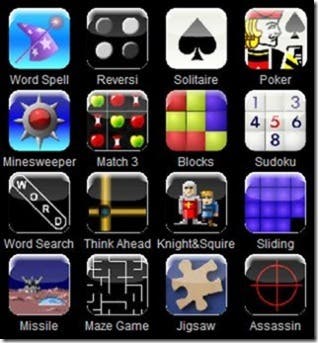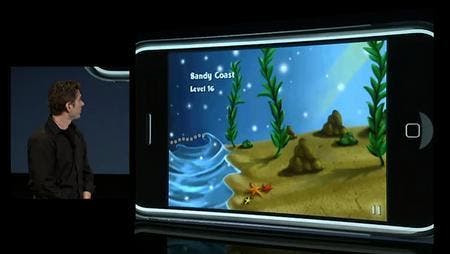iPhone Gaming
Apple's unexpected gaming platform.
Mobile gaming has always, despite the best efforts of a few pioneering developers, been the black sheep of the market. Those who own consoles, PCs and handhelds tend to look down their noses at any attempt to shift the hobby onto mobile phones - and not without some justification.
We've all enjoyed the odd game of Snake to pass a few dull minutes, but it still didn't sit well with most gamers when Nokia tried to claim that it was one of the world's most successful gaming companies as a result. Mobile phone hardware has traditionally been awful for games - dreadful controls, weak graphical abilities and uncooperative operating systems have made for terrible user experiences. Even gaming-focused mobile phones like the N-Gage have turned out to be high-profile flops, with a winning combination of phone and gaming features proving elusive.
It's not just the hardware that makes mobile gaming into a minefield, though. There's also the distribution network - a byzantine maze that mostly seems designed to raise prices by diverting big slices of revenue to meaningless middlemen, while simultaneously making it practically impossible for half-decent games to get in front of consumers. Not that anything ever really gets in front of consumers, since the process of finding, paying for, downloading and installing a mobile game remains one best suited to those with infinite patience and a love of obscure puzzles.
In short, mobile gaming is a bit rubbish, and its promise of providing another platform for games - one with a broad reach and a huge installed base - has never been delivered upon. Moreover, the hurdles standing in the way of mobile gaming's ascendancy don't look easy to overcome. Recalcitrant networks, a convoluted path to market, hidden data charges, awful distribution methods, dreadful control methods, hundreds of handsets of varying gaming prowess to support - not, surely, a landscape that's going to change any time soon.

Except that it did change - and it changed because of a company that hasn't traditionally been any kind of friend to videogames. Apple's iPhone has shifted the landscape of mobile gaming dramatically, suddenly - and probably mostly by accident. In attempting to build a hardware platform and a distribution network for its new mobile phone, Apple has coincidentally created the most interesting new entry to the videogames market in several years.
Before we start talking about the iPhone as a gaming device, let's make one thing clear - this isn't going to be a debate about the relative merits of the iPhone itself. We're sure many of you are delighted with your present phone, desperately in love with Symbian, and would happily marry Windows Mobile if only it were a real person. All of this is fine, and it's not what we're here to talk about.
However, to ignore the potential impact of the iPhone on the phone market as a whole would be as ignorant and foolish as those who dismissed the iPod (and, closer to home, the Nintendo DS and the Wii). The same stars are in alignment for the iPhone as for its older sibling. It's got a slick, appealing and supremely user-friendly interface, a hugely attractive physical appearance, straightforward connectivity with your computer (which will be a first for most phone users, who have never previously even tried to connect to their PC) and, of course, fantastic marketing and media exposure. Never underestimate the importance of that last factor to Apple's success.
As a hardware platform, iPhone is a success already. Before the launch of the latest version of the phone, it had an installed base of over six million units. Estimates suggest that in the weeks since launch, the iPhone 3G has sold three million units - bringing the total installed base to over nine million in under a year. (This doesn't even count healthy sales of the iPod touch, which can also run much of the software that's aimed at iPhone.)
IPhone has even managed to crack a notoriously difficult market - Japan. In the month of its launch there, the iPhone drove a mass exodus of phone users to exclusive provider SoftBank Mobile. Rival KDDI saw its subscriber numbers fall for the first time in its history as a result. If the trend continues, Apple will enjoy something many games companies covet - a thriving installed base in North America, Europe and the Far East alike.

As a software - and a gaming - platform, however, iPhone is in its infancy. Until a few weeks ago, it was strictly a closed system. Unless you cracked your phone, no third-party apps would run. Now, however, Apple has opened up the platform with the launch of the App Store, an online distribution system for iPhone and iPod touch applications (including games) which allows developers to set their own prices and upload their applications directly, with only a brief quality control system in place to ensure that applications don't break the phones on which they're installed.
In its first month, the App Store has seen about two million software downloads a day. The bulk of those are free - but the store still turns over around USD 1 million in revenue a day from its paid applications. That amounts to over USD 350 million in annual revenues, and can be expected to run a lot higher than that as more users come onboard and more developers start working on the platform. Apple boss Steve Jobs expects to see the App Store becoming a half-billion dollar marketplace "soon" - and reckons that its growth could eventually propel it past the billion-dollar mark.

